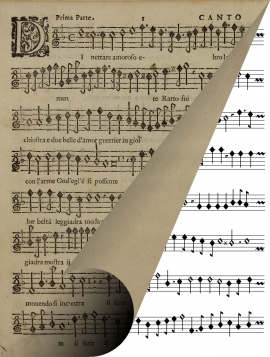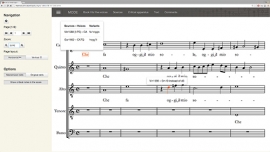A New Model for the Production and Dissemination of Music Scores
A New Model for the Production and Dissemination of Music Scores
Giuseppe Gerbino, Professor of Music History, Columbia University
Laurent Pugin, Co-director, Répertoire International des Sources Musicales, Switzerland
James Park, Undergraduate student, School of Engineering and Applied Science
Michael McMillan, Ph.D Music Composition, 2015
The Marenzio Online Digital Edition introduces a new model for producing and disseminating scores of Western music by integrating musical philology and digital technology. MODE aims to make available for the first time a complete critical edition of the secular music of one of the most important composers of the Renaissance, Luca Marenzio (ca. 1553-1599), a key figure in the European circulation of literary Petrarchism via texted music.
Using the recently developed Music Encoding Initiative schema – the standard parallel of the Text Encoding Initiative, which is now officially accepted for score submissions to the Library of Congress – MODE offers users the flexibility well known to other humanities digital editions but thus far unavailable to music. Today’s music editions are either published as paper-based scores or are available online as static PDF files generated from editions initially produced through traditional notation software.
Through the use of innovative software (Aruspix and Verovio), MODE overturns this paradigm, pioneering the future in music editions by introducing a new dynamic web-based digital interface developed during the last eight years. Scores become available for data mining (searching, analysis) and, thanks to the interactive interface, the critical apparatus, commentary, variants (both musical and textual), original source images, and metadata are fully integrated with the music notation. MODE is available to users through common internet browsers, so no proprietary software is needed.
Funding from the Price Lab for Digital Humanities will be used to develop the dynamic web-based interface and to enable the migration of the edition of twenty scores from traditional static PDF files to this interface. The Kislak Center for Special Collections, Rare Books, and Manuscripts also contributes to this project.



